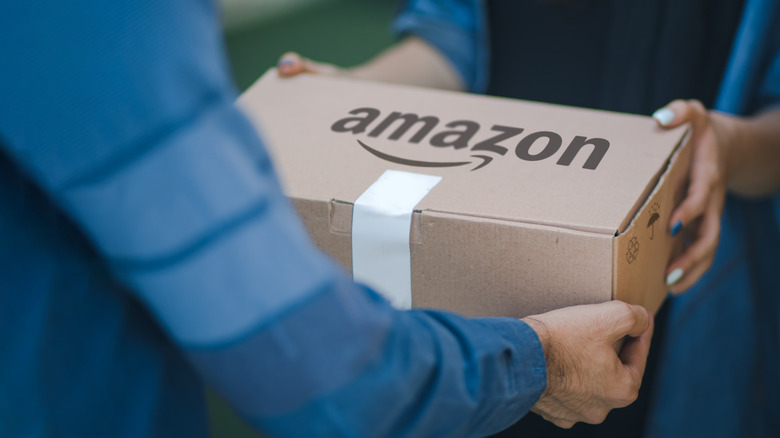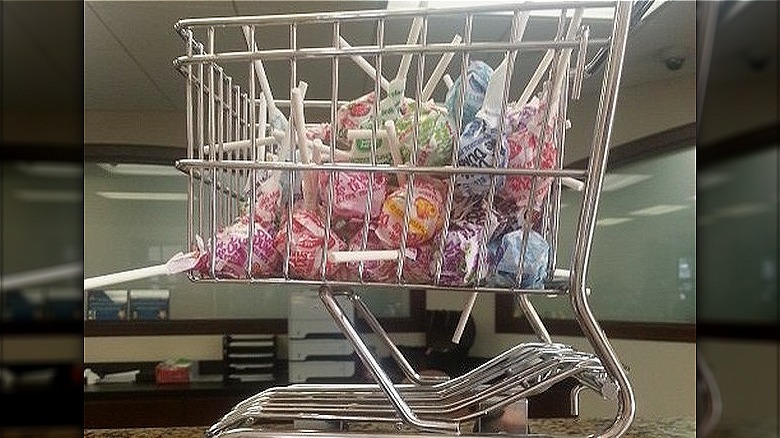The Lollipop Scam That Cost A Candy Company Millions
Dum Dums lollipops are iconic. They're found at just about every place where children (and their parents) go, and they're handed out for just about any reason — as a treat, as a pick-me-up, to cure a boo-boo, or if you're just looking to enjoy a good old-fashioned candy. While Dum Dums are one of the best-selling lollipops in the United States, and they consistently rank among the top-selling lollipops in the country on ratings sites like Find This Best and Popular List, the Spangler Candy Company, is losing millions of dollars in legal costs and lost sales, thanks to a practice known as drop-shipping, per Bloomberg.
Drop-shipping is the Amazon version of a price arbitrage, which per Investopedia, is when you buy something from someplace and sell it someplace else at about the same time. The practice is common when traders are dealing with financial instruments like equities and commodities, such as gold or wheat. In the case of Dum Dums, a buyer can pick up an order from a customer, buy a bag of lollipops from a cheaper source like Sam's Club, and then sell the item by having Sam's Club send the item directly to the buyer, Bloomberg reports.
Drop-shipping can hurt manufacturers
When a transaction happens this way, the seller benefits. Candymaker Spangler usually sells a 400-count pack of Dum Dums for about $26, but a seller can obtain the same pack through Sam's Club for $15 and sell that to an unsuspecting customer for $25 — skimming $6 of the $10 dollars made in the deal as profit after fees while Spangler misses out on the sale (via Bloomberg). According to Amazon, drop-shipping "is not acceptable unless it is clear to the customer that you are the seller of record." But it does allow drop-shipping under specific circumstances that include getting rid of any sign that a third party was involved and being responsible for dealing with any customer returns.
While the candy company said there were few violators in the beginning, this has changed — and so many people with fake company names are now selling DumDums that neither Spangler nor Amazon can keep up. Mitchell Owens, who runs e-commerce for Spangler, told Bloomberg, "It became a tsunami we can't control," Owens said. "There's an entire ... cottage industry encouraging people to start their own business selling on Amazon and drop-shipping from other retailers." Owens also says complaining to Amazon doesn't help because the company is "too big to listen to anyone. If you actually get a hold of someone, they'll say, 'I don't know what to tell you. Even though it's violating our policy, there's nothing we can do.'"
Spangler enrolled in Amazon's transparency program
Unfortunately, the practice is widespread thanks in part to the proliferation of drop-shipping tutorial sites and videos, which are easily discovered by doing a simple Google search. While Amazon tells Bloomberg that the company has "banned sellers from shipping products from other retailers to customers," Amazon itself has a section explaining drop-shipping as "a fulfillment model that allows entrepreneurs to outsource handling and shipping products to a third party."
To try and get around the problem, Bloomberg says Spangler has currently enrolled in Amazon's transparency program, which allows manufacturers to add a QR code to its products so it can track products as they are being shipped and sold. And while the candy company has seen an improvement, it believes it may only be a matter of time before drop-shippers find a new way to make money at their expense. While customers enjoy their favorite Dum Dums flavors for a bit cheaper, Bloomberg reports that Spangler has lost out on millions.


